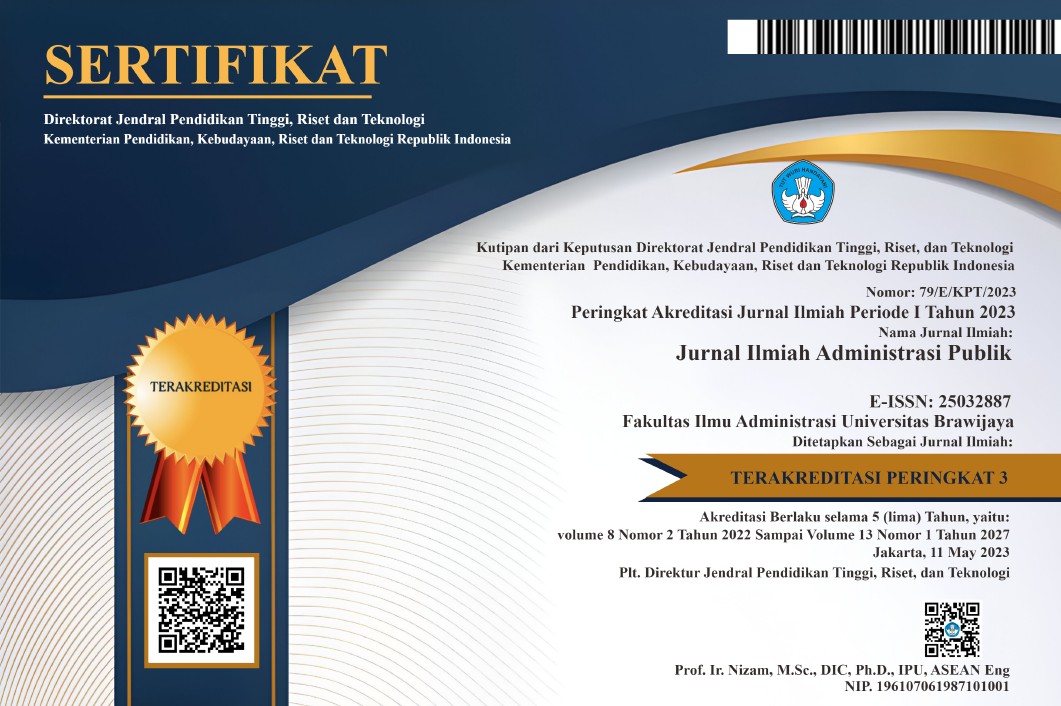The Application of Benchmarking in Public Sector – Lessons from Germany
DOI:
https://doi.org/10.21776/ub.jiap.2015.001.01.1Keywords:
benchmarking, public sector, GermanAbstract
This study aims at evaluating the usefulness and exploring the problems/challenges and potential improvements of the application of benchmarking in German public sectors. It is a conceptual paper or literature review that discusses how benchmarking is adopted in Germany. The data ismainly collected from secondary sources i.e. articles, scientific research, non-governmental studies. The study uncovered that benchmarking application in a federal country has a peculiar challenges and problem that hindered an optimal utilization and benefit of the benchmarking adoption. Thus, lessons learned can be obtained for other countries in developing benchmarking in their administration.
References
Adamascheck, B., (2010), Leistungsvergleiche in der öffentlichen Verwaltung – 7 Thesen zu Art. 91d GG, Institut für Strategie- und Organisationsentwicklung im Auftrag der Bertelsmann Stiftung.
Adamaschek, B., Kröning, V., and Timmer, R., (2011), Leistungsvergleiche nach Art. 91d GG. Vorschläge für Strukturen und Prozesse. Studie im Auftrag der Bertelsmann-Stiftung.
Brovetto, P.R. and Saliterer, I., (2007), Comparing Regions, Cities, and Communities: Local Government Benchmarking as an Instrument for Improving Performance and Competitiveness, The Innovation Journal: The Public Sector Innovation Journal, 12(3). pp.1-18
Camp, R. (1989), Benchmarking: the search for best practices that lead to superior performance, ASQC Quality Press, Milwaukee, WI.
Dorsch, J.J and Yasin, M.M (1998), A Framework for benchmarking in the public sector: Literature review and directions for future research, International Journal of Public Sector Management, 11 (2/3), pp. 91-115.
Grieble, O. and Scheer, A.W, (2000), Grundlagen des Benchmarkings öffentlicher Dienstleistungen, in: Scheer, A.-W. (Hrsg.): Veröffentlichungen des Instituts für Wirtschaftsinformatik, Nr. 166, Saarbrücken
Greiling, D., (2005), Performance measurement in the public sector: the German experience, International Journal of Productivity, 54 (7), pp. 551-567.
Hood, C. (1995). The ‘New Public Management’ in the 1980s: Variations on a Theme. Accounting, Organizationsand Society, 20 (2/3), pp. 93-109.
Kuhlmann, S., (2003), Benchmarking auf dem Prüfstand: Kosten, Nutzen und Wirkungen interkommunaler Leistungsvergleiche in Deutschland, Verwaltungsarchiv 94, Heft. 1, p. 99-126.
Kuhlmann, S., (2004), Interkommunale Leistungsvergleiche in Deutschland: Zwischen Transparenzgebot und Politikprozess. In: Kuhlmann, S./Bogumil, J./Wollmann, H. (Hrsg.): Leistungsmessung und Leistungsvergleich in Politik und Verwaltung. Wiesbaden, S. 94-120.
Kuhlmann, S., (2005), Selbstevaluation durch Leistungsvergleiche in deutschen Kommunen in Zeitschrift für Evaluation, 1(1), pp. 7-28.
Kuhlmann, S., (2010), Performance Measurement in European local governments: a comparative analysis of reform experiences in Great Britain, France, Sweden and Germany, International Review of Administrative Sciences, 76(2), pp.331-345
Kuhlmann, S., (2011), Messung und Vergleich von Verwaltungsleistungen: Benchmarking-regime in Westeuropa, in Die Verwaltung, Bd. 44, Heft 2/2011.
Kouzmin, A., Löffer, E., Klages, H., and Korac-Kakabadse, N., (1999), Benchmarking and performance measurement in public sectors towards learning for agency effectiveness, International Journal of Public Sector Management, 12 (2), pp. 121-144.
Larbi, G.A., (1999), The New Public Management approach and crisis States, UNRISD Discussion Paper No. 112.
Osimo, D., and Garies, K., (2005), The role of inter-regional benchmarking in the policy-making process: experiences in the field of information society, paper presented at the Regional Studies Association – Aalborg
Reichard, C., (2002), The Role of Markets and Competition in Modernizing Discourse in Germany, International Public Management Review, 3 (2), pp. 63-80.
Reichard, C., (2003), Local public management reforms in Germany, Public Administration Vol. 81 (2), pp. 345–363.
Reichard, C. (2004), Ansätze zu Performance Measurement in Deutschen Kommunen – eineBewertung ihres Entwicklungsstandes und ihrer Wirksamkeit, in Kuhlmann, S.,Bogumil, J. and Wollmann, H. (Eds), Leistungsmessung und -vergleich in Politik undVerwaltung, VS Verlag, Wiesbaden, pp. 341-56.
Riedel, H., (2010), Gesamtansatz zur Umsetzung von Art. 91d GG,Bertelsmann Stiftung.
Suerbaum, J, (2010). Online-Kommentare zum Grundgesetz Art. 91. in: Epping, Volker/Hillgruber, Christian (Hg.), Beck.
Sanderson, I., (2002) Evaluation, Policy Learning and Evidence-Based Policy Making. Public Administration, 1, pp.1-22
Schuster, F., (2003), Der interkommunale Leistungsvergleich als Wettbewerbssurrogat, Berlin, Verlag für Wirtschaftskommunikation.
Thau, A (2009), Benchmarking in öffentlichen Verwaltungen – Theoretische Fundierung und mögliche Weiterentwicklung eines Modernisierungsinstrument. Berliner Wissenschafts Verlags, Berlin.
Wollmann, H, (2001). „Germany’s Trajectory of Public Sector Modernization: Continuities and Discontinuities. Policy and Politics, 29 ( 2 ), pp. 151 – 69.
Wollmann, H. (2004): Leistungsmessung („performancemeasurement") in Politik und Verwaltung: Phasen, Typen und Ansätze im internationalen Überblick. ln: Kuhlmann, S. / Bogumil, J. / Wollmann, H. (Hrsg.): Leistungsmessung und –verglichen in Politik und Verwaltung: Konzepte und Praxis.
Yin, R. K. (2003). Case Study Research: Design and Methods. Thousand Oaks, CA: Sage Publications, Inc.
Downloads
Published
Issue
Section
License
If your paper is accepted, the author identified as the formal corresponding author for the paper will receive an email prompting them to login into Author Services; where via the JIAP Author Licensing Service they will be able to complete the license agreement on behalf of all authors on the paper.














